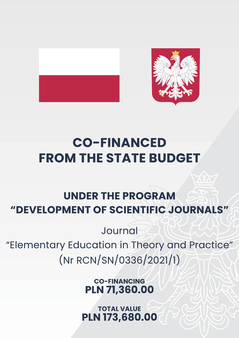Kitchen Lab for Kids: A Programme for Shaping STEM Skills in Preschool
Abstract
The authors of the article: “Kitchen Lab for Kids – a Programme for Shaping STEM Skills in Preschool” have presented the assumptions of the project financed from the European Funds within the Programme “Erasmus+ Action 2. School education – strategic partnerships for school education” (KA 201). The objective of five research teams from Italy, Ireland, Spain and Poland, is promoting the international exchange of the best practices and experiences in selecting active learning at the level of early childhood education and care (ECEC), as well as stimulating and encouraging teachers to find new, modern and interactive teaching methods, especially in the scope of STEM education. In the first part of the article the authors analysed the EU documents being the basis for the project actions. Also, they emphasized the meaning of improving the quality of teaching young children. In the further part of the article, they presented the methodological assumptions of the project and expected intellectual results.
Article prepared within the frame of Erasmus+ Project “Kitchen Lab for Kids,” grant number 2018-1-PL01-KA201-050857.
The article prepared with financial support of EU Erasmus+ programme. The European Commission’s support for the production of this publication does not constitute an endorsement of the contents, which reflect the views only of the authors, and the Commission cannot be held responsible for any use which may be made of the information contained therein.
References
Council recommendation of 22 May 2019 on High-Quality Early Childhood Education and Care Systems (2019/C 189/02), https://eur-lex.europa.eu/legal-content/EN/TXT/PDF/?uri=CELEX:32019H0605(01)&from=EN (access: 12.10.2019).
Europe 2020: A strategy for smart, sustainable and inclusive growth, https://ec.europa.eu/eu2020/pdf/COMPLET%20EN%20BARROSO%20%20%20007%20-%20Europe%202020%20-%20EN%20version.pdf (access 1.10.2019).
Gerlach J. (2012). STEM: Defying a Simple Definition, NSTA Reports 4/11/2012, https://www.nsta.org/publications/news/story.aspx?id=59305 (access: 15.06.2019).
Heckman J.J., Masterov D.V. (2004). The Productivity Argument for Investing in Young Children. Working Paper No. 5, Invest in Kids Working Group Committee for Economic Development, 4 October, http://jenni.uchicago.edu/Invest/FILES/dugger_2004-12-02_dvm.pdf (access: 15.06.2019).
https://ec.europa.eu/programmes/erasmus-plus/projects/ (access: 12.10.2019).
McClure E.R., Guernsey L., Clements D.H., Bales S.N., Nichols J., Kendall-Taylor N., Levine M.H. (2017). STEM starts early: Grounding science, technology, engineering, and math education in early childhood. New York: The Joan Ganz Cooney Center at Sesame Workshop.
Policy Department A: Economic and Scientific Policy. (2015). Encouraging STEM Studies for the Labour Market, http://www.europarl.europa.eu/RegData/etudes/STUD/2015/542199/IPOL_STU(2015)542199_EN.pdf (access: 12.10.2019).
Recommendation of the European Parliament and of the Council of 18 December 2006 on key competences for lifelong learning (2006/962/EC). (2016), https://eur-lex.europa.eu/legal-content/EN/TXT/PDF/?uri=CELEX:32006H0962&from=EN (access: 1.10.2019).
Saçkes M., Trundle K.C., Bell R.L., O’Connell A.A. (2011). The Influence of Early Science Experience in Kindergarten on Children’s Immediate and Later Science Achievement: Evidence from the Early Childhood Longitudinal Study, “Journal of Research in Science Teaching,” vol. 42(2), pp. 217-235. DOI: 10.1002/tea.20395.
Vandenbroeck M., Lenaerts K., Beblavý M. (2018). Benefits of Early Childhood Education and Care and the Conditions for Obtaining Them. EENEE Analytical Report No. 32. Prepared for the European Commission. Erasmus Plus. DOI 10.2766/20810.
Zdybel D., Pulak I., Crotty Y., Fuertes M.T., Cinque M. (2019). Developing STEM Skills in Kindergarten – Opportunities and Challenges from the Perspective of Future Teachers, “Edukacja Elementarna w Teorii i Praktyce,” vol. 14, no. 4(54). DOI: 10.35765/eetp.2019.1454.06.
Copyright (c) 2019 Elementary Education in Theory and Practice

This work is licensed under a Creative Commons Attribution-NoDerivatives 4.0 International License.
- When submitting a text, the author declares that he/she is the Author of the article (hereinafter referred to as the “Work”) and:
- he/she owns the exclusive and unlimited copyright to the Work,
- is entitled to dispose of the copyright to the Work.
Declares that it does not infringe any third party copyrights or legal rights.
Declares that there is no conflict of interest.
2. At the same time, the Author grants the Ignatianum University in Cracowa royalty-free, non-exclusive and territorially unlimited licence to use the Work in the following fields of exploitation:
- recording the Work in a hard copy, as well as on a digital or magnetic medium;
- reproduction of the Work using any technique, without limitation of the number of editions or copies;
- distribution of the Work and its copies on any medium, including marketing, sale, lending, and rental;
- introduction of the Work into a computer memory;
- disseminating the Work in information networks, including in the Internet;
- public performance, exhibition, display, reproduction, broadcasting and re-broadcasting, as well as making the Work available to the public in such a way that everyone can have access to it at a time and place of their own choosing;
- within the scope of dependent rights to the Work, including in particular the right to make necessary changes to the Work resulting from editorial and methodical development, as well as to translate the Work into foreign languages;
The licence is granted from the moment of the transfer of the Work to the Ignatianum University in Cracow. The Ignatianum University in Cracow is entitled to grant further sub-licences to the Work within the scope of the right granted. The licence is time-limited and it is granted for a period of 15 years, starting from the date of its granting.
Authors are permitted and encouraged to publish their text online (e.g. in their institution’s repository or on the institution’s website) before or during the submission process as this may lead to beneficial exchanges, as well as earlier and greater citation of the published text (See The Effect of Open Access). We recommend using any of the following portals of research associations:
- ResearchGate
- SSRN
- Academia.edu
- Selected Works
- Academic Search





